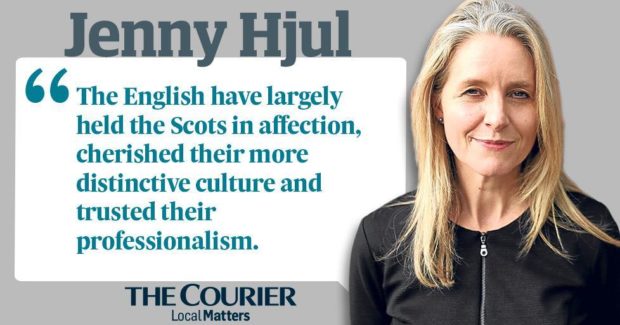Does Alan Cumming deserve our pity as a put-upon Scot in the bear pit of the British capital, Jenny Hjul asks.
If the Carnoustie-raised actor Alan Cumming says he has experienced anti-Scottish racism in London we will have to take him at his word.
Although, as a white Scot complaining about his treatment by the English, we can probably assume that he has not been targeted because of the colour of his skin, or by his ethnicity as such.
So, his perception of “racism” would be better termed “prejudice” because in his privileged white man’s shoes he will not have endured actual racism, as many persecuted minorities around the world do, not least in his chosen home in the US.
Having cleared up the semantics, the question is does Cumming deserve our pity as a put upon Scot in the bear pit of the British capital, or is he, as accused, indulging his anti-English grievances to please his SNP friends while back in Blighty for a few days?
Cumming is one of those avid Scottish nationalists who would rather not live in Scotland.
He fled to New York years ago, just as Sean Connery, another outspoken thespian separatist, decamped to the Bahamas.
People can live wherever they choose, of course, and still feel the pull of local politics, but whatever Cumming says about the English needs to be put in the context of his staunch support for Scottish independence.
When the nationalists lost the referendum in 2014, Cumming said he was devastated and had taken the defeat personally.
He continues to lend his celebrity weight to the cause and as recently as July backed calls for another vote.
None of which necessarily makes him anti-English, but he gave himself away after the Brexit vote, venting his fury on “stupid English people”.
Never mind that half a million Scottish nationalists opted to leave the EU, as did much of Wales, while London was very Remain, the bile rose instinctively towards his political foe.
He later apologised, saying, “I guess I’m just a daft Jock who assumes people still find humour amusing”.
Butt of the odd joke
This is revealing: Scots being rude about the English are funny, while the English mocking the Scots are racist.
I’m not a Scot who has lived in London but I am married to one who survived 20 years in the inhospitable south.
He may be thicker skinned than Cumming but he never felt the “insidious and subliminal” racism Cumming suffered, although his accent (more curdled than Cumming’s) might have been the butt of the odd joke.
As a southern English-sounding woman living in Scotland for even longer, the barbs lobbed my way are less light-hearted but that’s mostly online and I would say I have enjoyed the warm reception here that Cumming found in New York.
Tolerance apparently exists on both sides of the border but sadly there is intolerance too, and it doesn’t stem from London.
Where were the “Scotland get out of England” banners when the Scottish nationalist vigilantes were manning the border in July draped in “England get out of Scotland” flags?
Lunatic fringes
The protesters said they were inspired by Scottish politicians such as Nicola Sturgeon, who refused to rule out imposing post-lockdown restrictions on people travelling to Scotland from England, and by Ian Blackford, the SNP’s Commons leader and an enthusiastic supporter of Highlands xenophobia.
Senior nationalists may condemn their lunatic fringes but it is their divisive rhetoric that legitimises anti-English sentiment.
Only in Scotland could a cultural leader be openly condemned for being an incomer, as Vicky Featherstone was when she headed the National Theatre of Scotland.
She blamed Scottish nationalist bullying for her departure, and was duly called an English “colonist” by the celebrated Scottish novelist Alasdair Gray, for moving to Scotland to advance her career.
In the years she was here, Scots in London were running the country under New Labour, and while much vilified, they were not torn down for being Scottish.
Uglier elements of nationalism
The English have largely held the Scots in affection, cherished their more distinctive culture and trusted their professionalism, from acting to broadcasting to finance to sport (well, maybe not the latter so much).
It is only the uglier elements of Scottish nationalism that have may have curbed that affection lately, not the Scots themselves.
The majority of English still like their United Kingdom and have a vested interest in being nice to the Scots to keep them on board.
If they hated their northern neighbours, they would relish Scottish secession.
Scots in general may veer between indifference and mild disdain towards the English en masse. But Scottish nationalists are different – they need to have an enemy to make their case and the English are it.
The award-winning Cumming, now an American citizen, is implausible in his victim role.
The assumptions “made about your intelligence, your background, your education, in London, because of how you sound as a Scottish person” are invariably positive ones.











